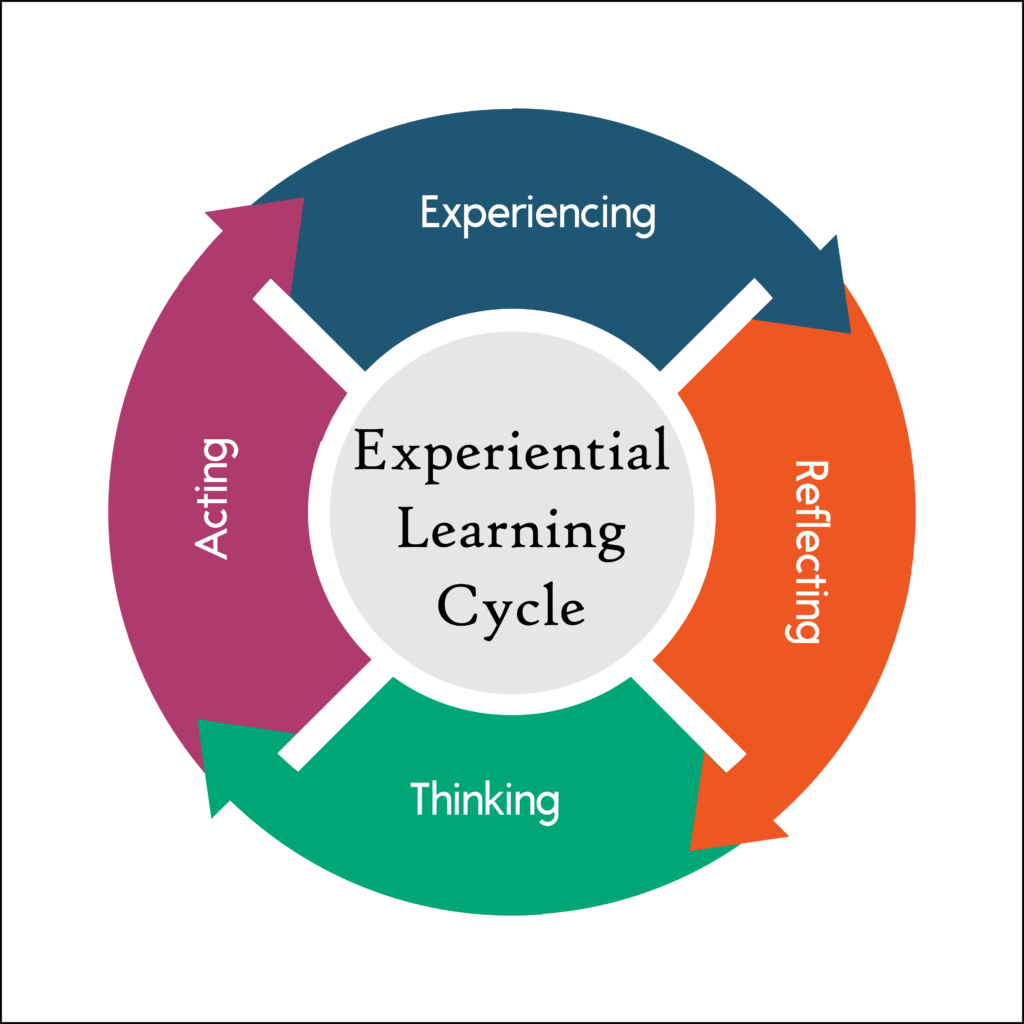Article written by Dr. Stacey Rosenberg and Dr. Elizabeth Christman, Southern New Hampshire University
Experiential learning is a type of educational philosophy in which educators provide students with the opportunity to apply the curricular knowledge gained from their academic coursework to real-world situations and challenges.
Southern New Hampshire University (SNHU) recognizes the value of experiential learning for students, especially when internship opportunities are limited. In 2018, SNHU developed the Higher Education & Real-World Training (HEaRT) model to help transform student learning and provide more equitable access to experiential learning opportunities. HEaRT provides an experiential learning environment in which students are connected with industry employers to problem solve through industry challenges. These practical experiences help learners further build their knowledge through application and reflection.
Experiential learning is important because it creates environments in which the learner can apply existing knowledge while developing new knowledge and skills in a practical context. This allows learners to deepen their understanding of content subject matter and cultivate skills that can be applied in various practice environments or employment settings.
Experiential learning is a valuable opportunity for students because it creates active engagement opportunities while increasing motivation and interest learn. Students who participate in experiential learning feel empowered to use their knowledge and skills in contexts that will aid in their career development.
Experiential learning also provides individuals with transferrable skills such as creativity, innovation, team collaboration, problem-solving, and critical thinking. These skills are useful for individual professional development and career growth. Experiential learning also provides students with opportunities to challenge themselves by engaging with complex real-world issues, and this can help learners build their confidence, resilience, and self-awareness.

What are the Outcomes of Experiential Learning?
Experiential learning yields strong outcomes aligned with the specific goals and objectives of the learning experience. Students who participate in experiential learning can develop improved knowledge and skill acquisition through practical application experiences. As learners develop their skills, this can enhance career readiness making individuals more competitive within the job market.
Additional outcomes of experiential learning include skill cultivation related to critical thinking and problem-solving. With experiential learning, these skills are intentionally fostered as students work to find solutions to real-world industry issues. Experiential learning provides an active learning environment for students allowing them to purposefully engage in developing a solution to a problem. The real-world application provides value and context to the learning experience, enhancing student interest and motivation.
As learners remain motivated to explore complex experiential challenges, they develop greater abilities to communicate and collaborate in their problem-solving. Individuals also demonstrate personal growth through their ability to challenge themselves to apply their knowledge and successfully address real-world problems. Thus far over 1,150 students have successfully participated in an experiential learning opportunity offered through HEaRT.
How Can Online Programs Incorporate Experiential Learning?
In higher education, access to internships is not always possible. This can be especially true in online programs. Yet, Inside Higher Ed and College Pulse found that 48% of college students have an interest in virtual or remote internships. Many students value the application opportunities that are fostered within an internship experience, recognizing that this can make them more competitive in the job market.
To help meet student needs, programs can incorporate problem-based or project-based learning experiences to help provide context and connection through authentic scenarios. John Dewey created the framework for experiential learning theory, which moves away from students being passive learners and puts them in the driver’s seat. Educators/mentors provide guidance and ensure experiences are educational.
Through project-based learning, HEaRT has connected over 16 employer partners with students from around the world to transform learning and increase equity in accessing experiential learning opportunities. This asynchronous experience is mutually beneficial as it addresses an identified need for both the student and employers.
In collaboration with career services, new employer partners identify a real-world need in their organization. The employer problem then becomes the focus of the experiential project challenge. Students then collaborate in small teams with a mentor/facilitator serving as a “guide” on the side,” facilitating team building, communication, and providing guidance and encouragement as teams work to develop the project deliverable.
During the HEaRT challenge, students can also network with employers and ask them questions. At the conclusion of the HEaRT experience, student teams have developed an evidence-based solution to present to the employer. The students can add this project work to their résumé and share a digital badge as a visual to showcase their new skills and project work experience.
How Do You Assess Learning Outcomes in Experiential Learning?
The process of assessing learning outcomes in experiential learning involves an acknowledgement of both the individual student development process and the culmination of project work with the end deliverable. Assessments are aligned to measuring both aspects through a reflection journal (self-assessment), a portfolio, or presentation.
A partner of SNHU, Peregrine Global Services offers knowledge and skills based assessments used by higher education institutions around the world.
The benefits to these types of assessments include the faculty’s ability to foster students’ growth and provide guidance as students acknowledge their self-development through the experiential learning opportunity. This also enhances student accountability for their learning experience, increasing their ability to recognize their own strengths and weaknesses while self-reflecting on their personal and professional development. It allows them to increase their critical thinking and track their progress within the learning experience.
The HEaRT model uses a mastery scoring framework to guide the cultivation of learning outcomes during the experiential learning opportunity.
To provide additional organization to the experiential learning assessment, the HEaRT model has developed competencies to assess outcomes within each experiential learning challenge. The competencies examine student mastery of knowledge application within real-world contextual scenarios, professionalism, teamwork, and project feasibility. The competencies are evaluated through the individuals’ contributions to the team, the final deliverables, and a reflection journal. These competencies are scored as either “mastered” or “not mastered.”
The HEaRT experiential learning model has connected students with a variety of industry specific challenges that are relevant in today’s job market. For instance, once HEaRT project connected two teams of students with leaders at Watermark Retirement Communities.
Each team was challenged to develop a recruitment and retention strategy to address the national retirement community agency’s nursing shortage challenges. Suggestions from students included offering fostering a climate of appreciation and focusing on advancement opportunities for nurses. Company leaders said they were impressed with the teams’ focus on company culture, which aligned with company values.
Other examples of HEaRT projects include projects related to:
- Learner research and recommendation to improve admission and transfer processes
- Enhancing cost effectiveness and the patient/clinician experience
- Marketing strategies utilizing telehealth care delivery to increase mental health awareness
- Organizational strategy development to enhance DEI awareness
- Legal, ethical, and regulatory implications around preferred pronoun usage
Southern New Hampshire University developed the HEaRT experiential learning model in 2018 to provide students with improved access to project-based learning experiences to enhance career opportunities. Experiential learning provides learners with industry problem- solving experiences while fostering individual motivation and interest in learning. Online programs can help meet student needs by incorporating project-based learning to provide context and connection through authentic learning experiences.
Dr. Stacey Rosenberg, DNP, RN, ACNS-BC, CNE, co-chair and co-creator of the award-winning Higher Education and Real-World Training (HEaRT) experiential learning model. She is the director of Southern New Hampshire University’s undergraduate nursing program and has worked in higher education for more than 20 years. She is a board-certified Adult Health Clinical Nurse Specialist and a Certified Nurse Educator.
Dr. Elizabeth Christman is a clinical faculty member in SNHU’s undergraduate nursing program. She has worked in higher education for over 12 years. She currently serves on the HEaRT team and works on many pilot initiatives to support students. Her clinical specialty is in cardiac critical care and post-anesthesia care, and she is a Certified Nurse Educator.
SNHU does not endorse or sponsor any commercial product, service, or activity offered on this website.


